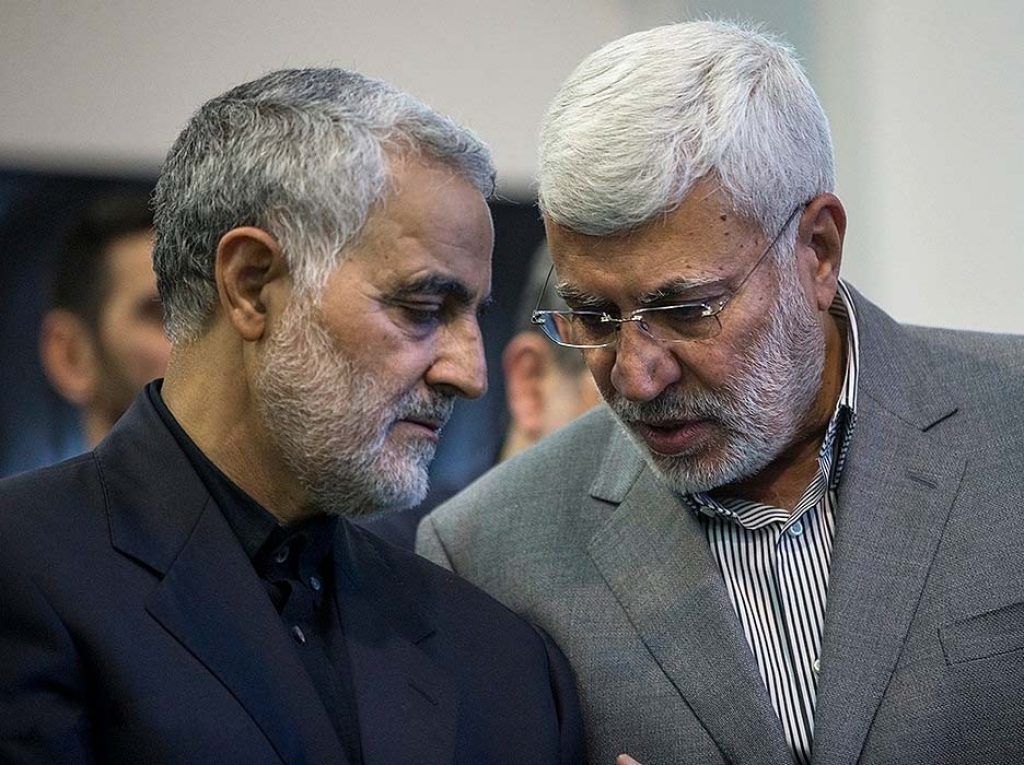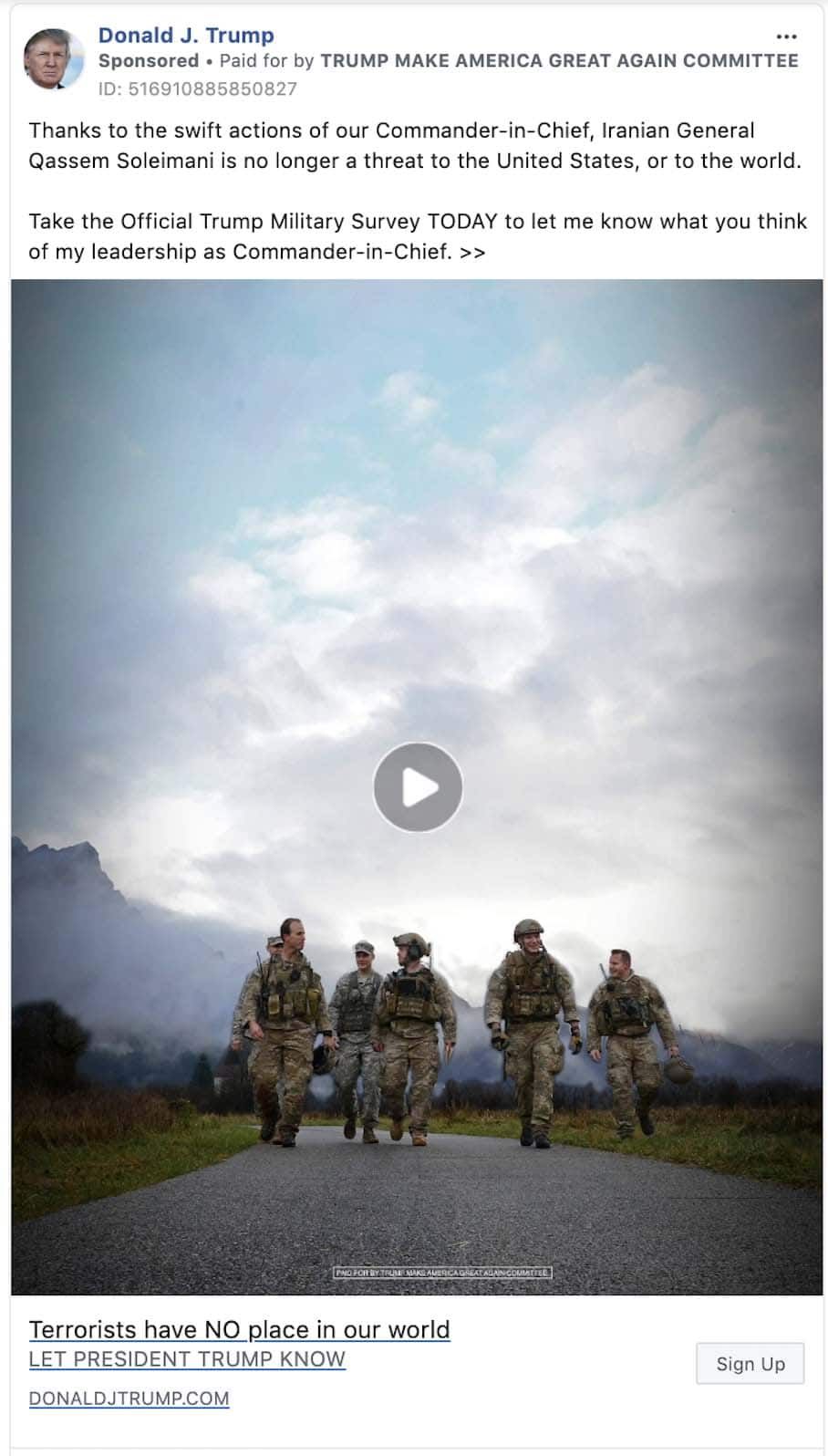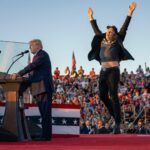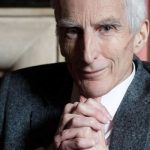Facebook removes pro-Soleimani Instagram content, calling it support for terrorism. Laurence Tribe says FB has it wrong
By Matt Field | January 15, 2020
 Facebook is taking down Instagram posts supportive of Iranian Maj. Gen. Qassem Soleimani, pictured here with Abu Mahdi al-Muhandis. Both men were killed in a US airstrike this month. The company said it's removing the posts to comply with US sanctions. Credit: Fars News Agency (Creative Commons).
Facebook is taking down Instagram posts supportive of Iranian Maj. Gen. Qassem Soleimani, pictured here with Abu Mahdi al-Muhandis. Both men were killed in a US airstrike this month. The company said it's removing the posts to comply with US sanctions. Credit: Fars News Agency (Creative Commons).
Soon after a US drone strike killed Iranian Maj. Gen. Qassem Soleimani in Iraq earlier this month, President Donald Trump’s re-election campaign began touting the “swift actions of our Commander-in-Chief” in paid Facebook ads that cast the killing in a positive light. When it comes to posts that appear to support the dead general, however, it’s a different story: Facebook is employing some questionable legal reasoning about US sanctions law to justify deleting such content from its subsidiary, Instagram.
Top legal experts are calling out Facebook for going further to restrict speech than even a 2010 Supreme Court ruling on sanctions against terrorist groups would seem to justify. The ruling, Holder v. Humanitarian Law Project, centered on human rights advocates who sought to provide training in international law and nonviolent conflict resolution to groups designated by the US State Department as foreign terrorist organizations. The majority ruled that the government wasn’t violating the First Amendment free speech rights of the Humanitarian Law Project and its co-plaintiffs by prohibiting the training they hoped to provide, on grounds that it was a form of “material support” for terrorists.
In the same case, however, the court said that speech by someone independent of a terrorist organization, even if it were supportive of the group, would not violate the law. “The statute is carefully drawn to cover only a narrow category of speech” that is “under the direction of, or in coordination with foreign groups that the speaker knows to be terrorist organizations,” Chief Justice John Roberts wrote in the majority opinion. In this instance, Roberts wrote, a terrorist group could use training in peaceful negotiation to buy time and prepare for new attacks.
But a Facebook spokesperson said that US sanctions law, and specifically the restrictions related to the State Department’s terrorism list, require it to remove not just content from sanctioned people or groups but also content that supports a sanctioned group or person.

Even the lawyers who argued the Holder case for the government agreed that speech done independently from a terrorist group does not violate the law. Facebook, however, appears to be taking a different stance. It is reportedly extending the Instagram takedowns far beyond the Islamic Revolutionary Guards Corps, which Soleimani helped lead and is itself a designated foreign terrorist organization. Facebook apparently is pulling down content from people who are unlikely to be affiliated with the military unit, or, for that matter, even very supportive of it.
For instance, the website Coda reported that Iranian human rights advocate Emadeddin Baghi had his Soleimani-related posts taken down, even though he’s regarded as a critic of the Revolutionary Guards. Amnesty International once decried his treatment in the notorious Evin Prison in Tehran. Baghi, according to Coda, called the drone strike on Soleimani “an act which is contrary to the principles of international law.” After the story ran, Instagram reportedly restored Baghi’s posts.
Coda reported that the Instagram account actions have been widespread, affecting Iranian media organizations, journalists, activists, and influencers. Instagram is one of the few Western-based social media applications not blocked in Iran by the government.
And while censoring Baghi is being cast by Facebook as a mistake, a background statement from the company makes clear that its policy is to remove posts that support or represent sanctioned people or groups. As in Baghi’s case, the policy could easily ensnare content that is simply critical of the administration’s decision to target Soleimani.
“Facebook appears to be equating political or legal opposition to the Trump administration’s killing of Soleimani with indirect support for Soleimani himself and thus analogizing it to properly forbidden material assistance to non-state terrorist groups,” Harvard Law School professor Laurence Tribe wrote in an email.
“Any such equation wades deep into clearly forbidden speech-suppressing territory, well beyond what even the majority in Holder v. Humanitarian Law Project authorized as consistent with the First Amendment.”
Other experts agree. The American Civil Liberties Union’s David Cole, who represented the Humanitarian Law Project at the Supreme Court a decade ago, suggested on Twitter that Facebook was getting the ruling wrong. “In fact, in upholding the prohibition of ‘material support’ to designated foreign terrorist orgs, the Sup Ct. and US stressed that independent advocacy in support of such groups is NOT barred,” Cole wrote.
The Soleimani killing and its aftermath are certainly of great public interest. After the drone strike, Iran announced that it was rejecting certain international limits on its nuclear program, launched a missile attack against US military forces, and shot down a civilian airliner.
In addition to the State Department’s terrorist organization designations, Facebook’s background statement referenced the Treasury Department’s Office of Foreign Assets Control. The Treasury Department recently announced new sanctions against people and groups in Iran, but they largely involve economic activity. The agency did not respond to a request for comment on how the sanctions could relate to restrictions on speech on Instagram.
In a leaked internal memo, Facebook executive Andrew Bosworth told employees last week that the company shouldn’t put its thumbs on the scale to impede Trump’s re-election bid, suggesting Facebook has a commitment not to take sides in politics. But in the case of Iran and Soleimani, the company’s views seem to be different—and coincidentally (or not) in line with the US administration’s position.
That’s a scale Facebook appears to be willing to tip.
Together, we make the world safer.
The Bulletin elevates expert voices above the noise. But as an independent nonprofit organization, our operations depend on the support of readers like you. Help us continue to deliver quality journalism that holds leaders accountable. Your support of our work at any level is important. In return, we promise our coverage will be understandable, influential, vigilant, solution-oriented, and fair-minded. Together we can make a difference.















